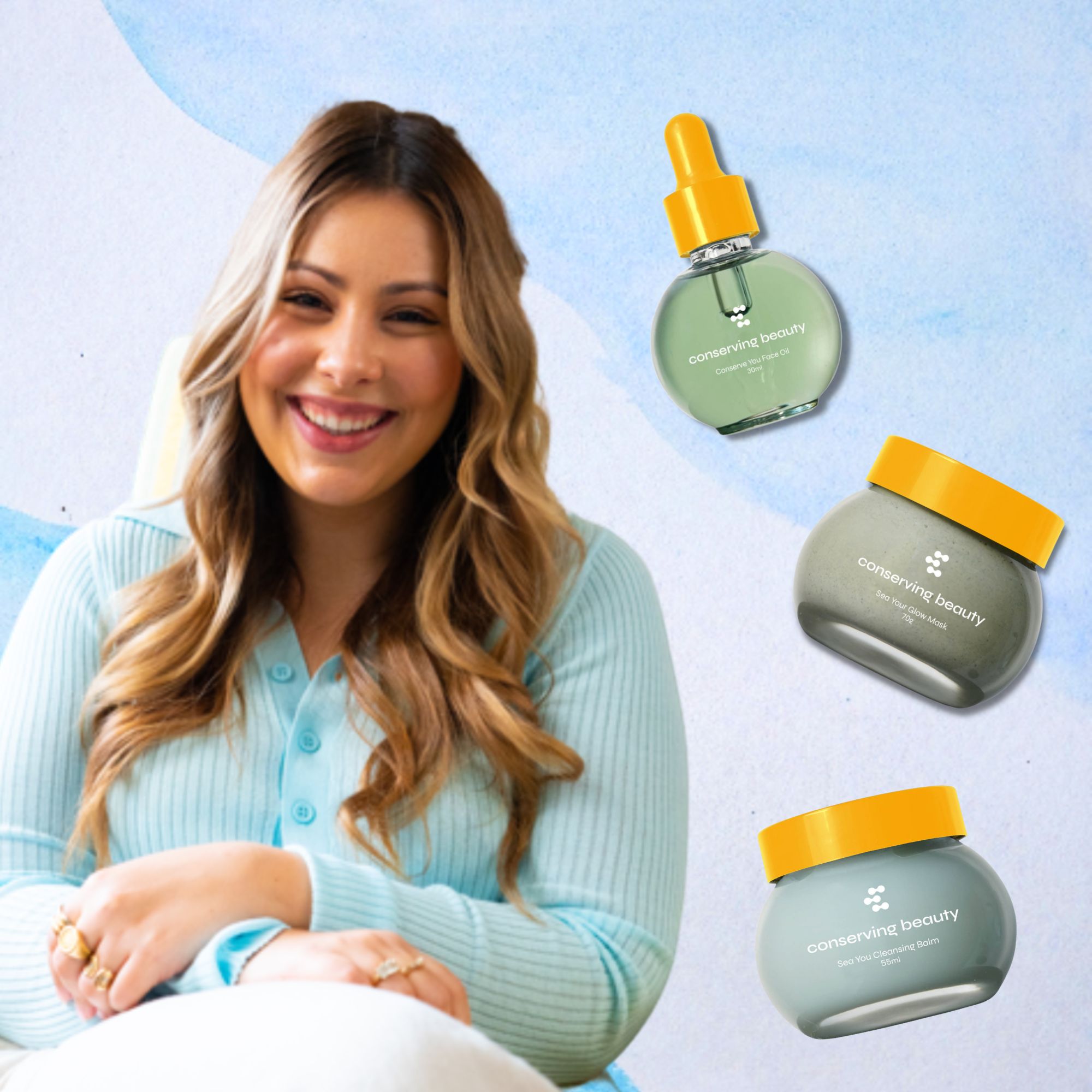
- POPSUGAR Australia
- Beauty
- Damn Gina Founder Sumana Jayanth On Haircare as Self-Love and Creating Your Own Beauty Standards
Damn Gina Founder Sumana Jayanth On Haircare as Self-Love and Creating Your Own Beauty Standards

For International Women’s Day, POPSUGAR Australia sat down with Aussie women excelling in the ever-evolving business of beauty. We picked up tips, tricks, and the secret to surviving and thriving in business.
Sumana Jayanth is the founder of Damn Gina, a hair accessories brand that specialises in products for textured hair and encourages those with curls and coils to embrace their natural look. Jayanth spoke to POPSUGAR Australia about challenging Eurocentric beauty ideals, dealing with post-partum depression while running a business, shutting down mansplainers and not letting the pursuit of perfection get in the way of success.
POPSUGAR Australia: What was your background before starting in the beauty industry? Was beauty something you always saw yourself doing?
Sumana Jayanth: No, actually. I think I wanted to be a doctor! I grew up in India, and just like a lot of Indian families I was told the best careers were in the science stream — engineering or medicine, and if not, law. I was really interested in biology, and I thought I’d be a doctor, but when I finished year twelve, I thought, “This is too hard!” But I do have a degree in engineering!
After leaving India, I lived in Singapore and Hong Kong before moving to Australia in 2014. In Hong Kong, getting a job was tricky because you need to be bilingual. I moved to Australia and then worked for someone else while running a small side business selling jewellery from India in a little market in South Melbourne. That was my very first taste of small business!
PS: When did you get the initial idea for Damn Gina?
SJ: It had a lot to do with my personal experience.
I have curly hair, and I was okay with it growing up. But once I became a teenager, Britney Spears was big, and she had that super straight hair. So, that was the beauty standard. I would brush and brush my hair, but it would never be that sleek and straight. That’s when I discovered hair straighteners and heating tools. For the next fifteen years, I used chemical straighteners and hot tools until I was 30 and my hair was so deep fried it was falling out. I felt like it was time I started embracing it.
It was perfect timing, it was around the time the self-love and body acceptance movement really took off, and hair was a part of that. So I started looking for products that would help my curly hair journey. There were a lot! From shampoos and conditioners and gels — but when it came to accessories everything was from Amazon or eBay, or an afterthought from a brand that was making pillows. They didn’t fit right and it felt very much like a secondary category and an afterthought.
PS: What was the Damn Gina journey from concept to fruition?
SJ: We went through a few iterations of our own product — the idea was to make it accessible for everyone and reduce the time people were taking to prep their hair. Many people are taking an extra 45 minutes in the morning to style their curls. So it’s just more time efficient to straighten them and slick them back. I figured if we minimized the time it took for people to style their natural curls, more people would embrace it.
From the initial prototype, it took months. The most important relationship was with my manufacturer, also from India. We both spoke the same regional language, and we hit it off. This wasn’t a product he had done before, but he was willing to experiment. He made samples for six months without me paying him any money — I don’t think that happens anymore. He placed a lot of trust in me.
Then not long after launching, we sent Abbie Chatfield our product to try. I really have a lot to thank her for! She was just leaving “The Bachelor” then and has curly hair, and she gave us a shout-out that opened so many doors for us instantly. I absolutely adore her! It’s breaks like that that push you forward.

PS: What’s the hardest thing about running a business day-to-day?
SJ: There’s a lot of it I actually enjoy operationally! I even look through our customer service emails in the morning. I know I shouldn’t, our team are amazing, but it’s out of habit and I want to see if there’s anything that requires immediate attention. Then I’m very involved in strategizing, marketing, operations, and logistics.
I think the most challenging part was becoming a mum last year. I experienced postpartum depression. So managing a business, my mental health, and being there for my child was probably one of the hardest things I’ve done.
Sumana Jayanth, founder of Damn Gina
I think the most challenging part was becoming a mum last year. I experienced postpartum depression. So managing a business, my mental health, and being there for my child was probably one of the hardest things I’ve done.
I had never experienced depression, and I thought I was just tired from being a new mum and running a business. It wasn’t until someone else noticed and said “you don’t look well” that I realised I needed to see a therapist. It caught me by surprise. Now when I hear someone saying something even remotely similar to my experience, I share my story. It’s up to them what they do with that information, but I want people to be aware, and there’s no shame in sharing. It’s a lot better now, but it was very challenging.
The second most challenging part is cashflow. We’re completely bootstrapped, I own 100 percent of the VA business, and we don’t have any VC funding. It’s an enormous thing to stay on top of.
PS: When you think of challenges facing women in business in 2023, what springs to mind?
SJ: Trying to raise capital as a female founder, and a woman of colour, the chances are very low, and it’s the same in the US. Apart from that, one thing immediately springs to mind. I’m currently recruiting for my marketing team, and a few men have applied. The way they respond to emails is astounding, addressing criteria like I don’t know what I’m looking for in a marketer as a female founder. I’m sure they’re great, they may have six years’ experience in marketing.
They will argue with the job description and undermine the key tasks and skills I’ve requested. They’ll mansplain them to you!
It’s the same when you’re working with agencies, and I know marketing. It’s not in a way where they are trying to be nice and educate you — it’s dismissive. They’ll ask you, “Have you tried running Facebook ads?” or, “Do you know how to use an Excel spreadsheet?” As soon as it’s anything to do with finance, digital, or technical, they assume you know nothing!
It’s the same when you’re working with agencies, and I know marketing. It’s not in a way where they are trying to be nice and educate you — it’s dismissive. They’ll ask you, “Have you tried running Facebook ads?” or, “Do you know how to use an Excel spreadsheet?” As soon as it’s anything to do with finance, digital, or technical they assume you know nothing!
Sumana Jayanth, founder of Damn Gina
PS: A lot of people talk about work-life balance. Is that something you set store by?
SJ: No. I’ve actually stopped working on a balance. I think we as women are perfectionists, and when we don’t achieve perfect “balance”, we’re very hard on ourselves.
I’ve stopped seeking balance now. I don’t worry about meeting all my daily goals — some days, I don’t feel like meditating before work, and some days I don’t answer all my emails. I feel that’s how men work. When they’re working, they’re working. When they’re playing cricket, they’re playing cricket. They’re not thinking: “Should I be spending time with my child right now? Should I be spending time with my family? Or answering this email?” We need to adopt that approach.
I’ve actually stopped working on a balance. I think we as women are perfectionists, and when we don’t achieve perfect “balance”, we’re very hard on ourselves. So I’ve stopped seeking balance now. I don’t worry about meeting all my daily goals — some days, I don’t feel like meditating before work, and some days I don’t answer all my emails.
Sumana Jayanth, founder of Damn Gina
That said, I don’t believe in hustle culture. Don’t hustle so hard that you forget your mental health, because that will catch up.
I believe in working hard, but hustling so hard that you’re waking up at 4 am? It used to be a bragging point that people only slept six hours a night. Sleep is important. Spending time with your family and relaxing is important. It helps your productivity more than being in front of your computer trying to work weekends and weeknights.
PS: What do you wish you’d anticipated before starting in business?
SJ: I have really enjoyed the way Damn Gina has grown. It wasn’t an overnight success, but the growth has been steady. Looking back from a revenue point of view, I would say having a product that can be resold is a huge advantage. Having a product like a shampoo or a moisturiser or even a chilli oil is hugely helpful. Something people find that works for them that they can buy again and again.
PS: What would your advice be to someone getting started in business?
SJ: As business owners, we focus on perfecting everything — from the brand colours to the website.
I don’t think these are the things we should be focusing on. I would say get the product and launch it — even if it’s imperfect. Test the market. What if you launch a perfect product and realise the market has outgrown it or your competitors have already taken over? That’s three years gone.
When we started Damn Gina, the first hair wrap was so big and just one size that it only worked for 60 percent of our customers. So many customers were good enough to give us feedback that it was a good product, but it needed some tweaking.
So we refunded them, took that feedback and added a drawstring so it could be adjusted and wouldn’t slip at night. If I’d waited three years for the “drawstring” lightbulb moment, the brand probably would have launched this year instead of in 2019. Don’t strive for perfection because you will delay your entire process. Don’t worry about the website. Make a new one when you’ve made your first million!
PS: Are you a naturally confident person, or is it something you’ve had to work on?
SJ: I’m good at talking in person, but I’m not good at being on camera. I think the younger generation are so much more comfortable in front of a camera! I’m much more comfortable in conversation, although I initially struggled with imposter syndrome. Because there weren’t many brands in the market doing this, I felt I was making a product nobody wanted. Because otherwise, everyone would be doing it!
I have gotten much more confident about the brand and the product, and about our direction. I was a little directionless, and having focus gives you confidence.



